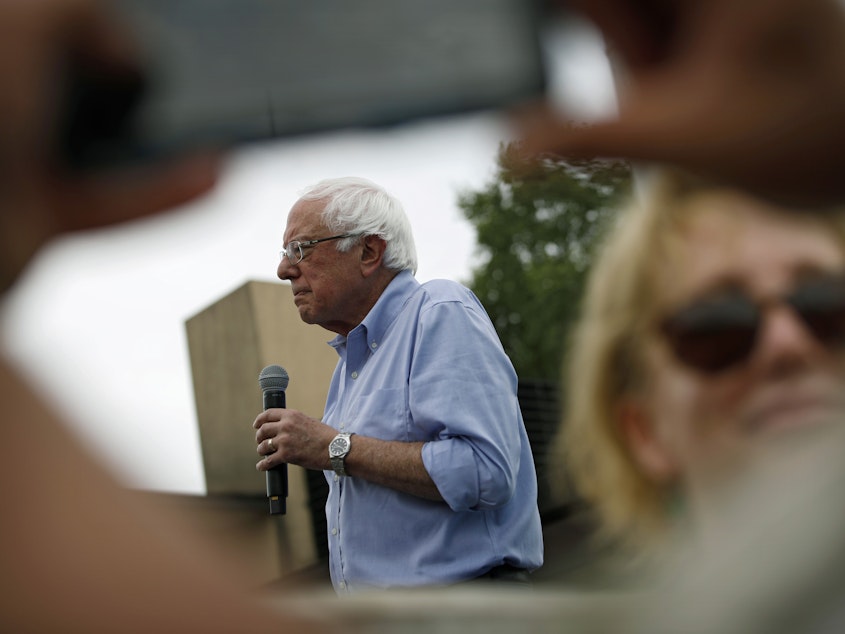Bernie Sanders Again Attacks Amazon — This Time Pulling In The Washington Post

Sen. Bernie Sanders of Vermont is lashing out at the media coverage of his presidential campaign — in a way that might sound familiar.
"I talk about that all of the time," Sanders said of Amazon paying "nothing" in taxes. "And then I wonder why The Washington Post, which is owned by Jeff Bezos, who owns Amazon, doesn't write particularly good articles about me. I don't know why," he said at a campaign event in New Hampshire on Tuesday. Bezos is the founder and CEO of Amazon and privately purchased The Post.
The remark sounded an awful lot like the kind of criticism leveled by someone else.
"...[T]he failing New York Times and the Amazon Washington Post do nothing but write bad stories even on very positive achievements - and they will never change!" President Trump tweeted last year.
Trump has tweeted or retweeted criticism of the paper, tying it to Amazon more than 30 times since running for president. Candidates voice criticism of the media all the time in an attempt to curry better coverage. Every campaign pushes back against stories it thinks were done unfairly, including Democratic presidential candidates in this field, from former Vice President Joe Biden, whose campaign does not like what it sees as the media's focus on his gaffes, to entrepreneur Andrew Yang, whose loyal followers don't believe he gets enough coverage.
Sponsored
But none are echoing the president's language or accusing news outlets' owners of influencing coverage in quite the same way. The Post's editor, Marty Baron, noted that Bezos does not influence the newspaper's coverage and accused Sanders of peddling a "conspiracy theory."
"Sen. Sanders is a member of a large club of politicians — of every ideology — who complain about their coverage," Baron said. "Contrary to the conspiracy theory the senator seems to favor, Jeff Bezos allows our newsroom to operate with full independence, as our reporters and editors can attest."
The Post reported last month on a labor fight within the Sanders campaign. It noted that workers wanted annual salaries at least equivalent to a $15 an hour minimum wage, for the campaign to cover all health care costs for those making $60,000 a year or less and to reimburse for travel and use of their own vehicles at $0.58 a mile.
Sanders has argued that Amazon, the online shopping behemoth, should pay more in taxes and pay its workers more. Several communities, for example, offered tax abatements in exchange for Amazon moving its second headquarters to their cities, and it's unclear if Amazon paid anything in taxes at all last year, the Wall Street Journal reported. Amazon moved part of what would have been its second headquarters out of New York recently because of protests against the deal New York City gave it.
Sanders has been critical of corporations, including Amazon, that do not or did not have a $15 minimum wage, the level he wants to be a federal minimum. Facing pressure, including from Sanders, Amazon raised its minimum wage to $15 in October of last year.
Sponsored
Sanders has also introduced the "Stop BEZOS Act," (BAD EMPLOYERS BY ZEROING OUT SUBSIDIES), which would, according to Sanders' Senate office:
"...establish a corporate welfare tax on large employers equal to the amount of federal benefits received by their low-wage workers. For example, if a worker at a large employer receives $300 in food stamps, the employer would be taxed $300. ... The Stop Bezos Act gives large employers a choice: pay workers a living wage or pay for the public assistance programs low-wage workers are forced to rely upon."
There appeared to be a detente between Sanders and Bezos with the move to raise Amazon's minimum wage in October. Sanders praised the move, calling it "enormously important."
Bezos replied on Twitter, saying he was "excited about this" and that he hoped "others will join in."
While Sanders has again shown fundraising strength during his 2020 presidential bid, he has struggled to gain the kind of traction he had in the 2016 presidential election.
Sponsored
He is competing with a much broader field of progressive candidates, including Sen. Elizabeth Warren of Massachusetts, who has now passed him in an average of national polls. She is ahead of him in the key early states of Iowa and polling close to him in New Hampshire, where Sanders won handily in the 2016 primary. [Copyright 2019 NPR]



